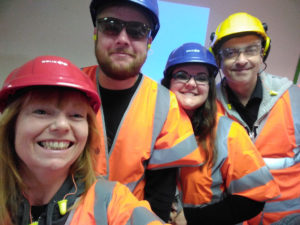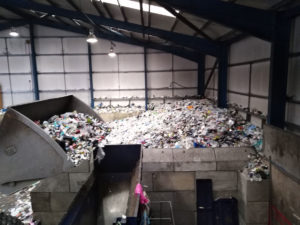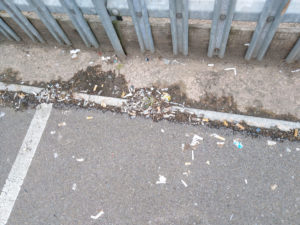Today Councillors with an interest in waste and recycling went along for a trip around East Devon’s RRC at Greendale. What an eye opener – even just turning into the Greendale site took my breath away – the sheer size of the industrial site is staggering. East Devon/Suez just have a little bit of it, Unit 42, for the RRC, and it takes a bit of finding, tucked away in one sector.
 Arriving at 8am, so that we were out of the way of reception when collection trucks started arriving, we were greeted by Gareth Bourton, EDDC Recycling & Waste Contract Manager, and Harry and James, the Contract and Assistant Contract Managers for Suez. We had a short introduction, told that recycling was now the most dangerous sector, in front of construction, and so that safety was paramount, so we all donned our very fetching safety gear.
Arriving at 8am, so that we were out of the way of reception when collection trucks started arriving, we were greeted by Gareth Bourton, EDDC Recycling & Waste Contract Manager, and Harry and James, the Contract and Assistant Contract Managers for Suez. We had a short introduction, told that recycling was now the most dangerous sector, in front of construction, and so that safety was paramount, so we all donned our very fetching safety gear.
We then went out onto the floor of the recycling unit. We walked past a machine that uses a magnet to pull out the steel – all the tin cans basically. It isn’t perfect, and a lot of plastics get caught up with it. This is especially problematic when the cans are placed inside plastic bags so the advice is not to do that.
Warning: the videos, if you play them up loud, are very loud! It’s a loud place!
This will be passed through the magnet again to further remove more of the plastic etc so the steel should be perfect. This and aluminium are the great forms of the closed recycling loop that we are hoping for so it is important to keep the quality of these high, as the price fetched for aluminium in particular is always high).
 Walking on past this machine, we went up the steps to start seeing the whole process. From the left hand side a truck will deposit the ‘raw’ contents of our green recycling bags (mixed plastics, steel tins, aluminium cans, tin foil), which gets picked up by the conveyor belt. The two men at the top are pulling out stray carrier bags etc:
Walking on past this machine, we went up the steps to start seeing the whole process. From the left hand side a truck will deposit the ‘raw’ contents of our green recycling bags (mixed plastics, steel tins, aluminium cans, tin foil), which gets picked up by the conveyor belt. The two men at the top are pulling out stray carrier bags etc:
A view from the other side as the magnet sucks up all the steel cans and deposits them below:
This is then the last stage for this area when aluminium has been removed (by fans – aluminium is not ferrous so magnets can’t be used – the fans blow the cans off the top of the conveyor belt somehow and they land in a second bay below), and this is the ‘mixed plastics’ which includes a fair amount of stuff that shouldn’t have been recycled.
As far as we know the tolerance of accepted errors means that not much of our plastic gets rejected – it goes off to the processors to be sorted further.
After the tour around, we went back for our presentation. Unfortunately we didn’t see a vehicle unloaded.
Summary of presentation:
- Suez is an outsourced model – it is under a contract but is approached as a joint team. There are various criteria that have to be met but the rounds must be completed every day. Missed collections are very low (but should be reported whenever it happens to allow them to sort it out) but are currently running around 70 out of every 100,000 collections.
- The system is driven by customers at the front end so education is key.
- East Devon own the assets of the centre but agree with Suez what they need. Suez hold the Environmental Permit (from the Environment Agency) and the Operators License for the fleet of vehicles.
- There are now 10,300 Green Waste Customers – the green waste stays local, is turned into compost, and is now being used by EDDC.
- From the total collection, c40,000 tonnes annually, 57% is recycled and 43% is not – sent to Energy for Waste plant.
- Devon County Council is the Disposal Authority, so they offer ££ incentives to increase recycling percentages, and they use 2015 tonnage sent to EfW to incentivise reductions (Avoided Waste Disposal) as everything they have to dispose of costs money, so better to reduce that overall (excellent!)
- Income to pay for recycling comes from:
1 Council Tax
2 Recycling Credits (DCC)
3 Avoided Waste Disposal £ (DCC)
4 Material Sale – open market, commercial, dependent on prices - Suez cannot tell us what criteria the contractors they sell to operate under as it is ‘commercially sensitive’. I raised the point that how then can we confidently say that nothing goes abroad, if we don’t know who it is being sold to, and if the market drops out of certain types of plastic how can we stop someone dumping it abroad? Answer…commercially sensitive but am assured by Suez that all EDDC’s go to UK Market – but what happens to it after that???
- DCC broker paper, glass and textiles for the county (Paper goes to Norfolk, Glass to Sheffield, Textiles to Kettering where Salvation Army sell good stuff in their shops, and ‘export poorer quality for reuse to Africa and Middle East – worth investigating why and do they want it?)
- The Suez Trading team broker metals (aluminium and steel), cardboard and plastics (Plastics go to Roydon in Manchester who apprently always take ours because they know it is good quality. Investigate what happens next) James assures me that Rowden have to have the same standards as Suez when it comes to Environment Agency permits…
- Food goes to an Aneaerobic Digester (AD) in Somerset where it is broken down by millions of microorganisms then tapped for Methane, which is burned to generate electricity that can feed the national grid, then the resulting materials (digestate) is used as a soil conditioner.
- Batteries get recycled at GP Batteries who remove all the useful parts of the batteries and recycle them thoroughly
- Aluminium is the perfect material for recycling as it takes a great deal more energy to make from new than it does to recycle.
- Clinical Waste is picked up and has to be burned at extremely high temperature so goes to Liskeard in Cornwall
- Electrical items go to a processing plant in Exeter.
- What is Devon’s total recycling as a whole? c52%
- East Devon’s =results are
60% Recycled and Composted
38% Recovery (ERF)
2% Disposal (Ash from ERF which has to be landfilled but very safely) and…WAIT FOR IT…DOG WASTE
DOG WASTE – this is a classic…
Did you know that dog waste goes to LAND FILL? 20 tonnes a month in East Devon alone!
If it wasn’t collected separately, it could go to general waste and be burnt for energy but that can’t happen when it is collected on mass. We would be better putting it all in general bins, in the park for example, where it gets mixed in with other general waste, than collecting it separately. My suggestion would therefore be that in every situation where we have a bin, we have one on one side which is general waste including dog poo, and one adjacent to it with recycling (clearly marked as to what can go in there), and get rid of the poo bins completely! If we collected aluminium cans, glass bottles and plastic bottles at every bin point, that would bring down those items going into EfW because when they are collected by StreetScene they ARE NOT SORTED!
- What are the implications of Brexit? As yet unknown – it will be a buyers’ market if EU markets close. We may be able to stock pile, if we request permission from Environment Agency. Europe do need it for manufacturing so maybe it won’t be a problem. We need to ensure we have vehicle spares and fuel (although 80% comes from Norway via a pipeline).
- What are the biggest contaminants in plastic recycling?
Plastic Film
Expanded Polystyrene
Tablet Blister Packs
Sweet/Crisp Packets
Disposable Coffee Cups
Carrier Bags
Foam
Cardboard Takeaway Boxes (Food Contamination) - What else can the public do?
Be encouraged to keep cardboard and paper separate in the green box
Don’t try and recycle broken glass because cardboard is becoming contaminated with glass shards and cannot then be recycled, meaning the whole lot is wasted
Tablet Blister Packs – put in general waste, not recycling
Report litter from recycling days (don’t just clean it up because it doesn’t give a picture to the managers)
Keep lobbying to get black plastic and mixed plastic bottles removed from production. Ask our MP to help 🙂 - DEFRA have been in consultation with everone from the public (I completed the survey – it was very long) to Suez, Councils, Companies etc and will be publishing the second round of their findings in the Autumn. This is likely to have big implications and in 2023:
There is likely to be a plastic tax – every thing made of plastic must contain at least 30% recycled plastic
Deposit Recycling Scheme – details to come
Extended Producer Responsibility scheme to put the cost of recycling back onto the producers - For anything flytipping related, we have to talk to DCC and will do that with Geoff Jung, the Portfolio Holder for the Environment for EDDC (who was there earlier and is brilliant)
- An interesting discussion happened after the meeting re Crisp packet recycling with Terracycle… not worth it according to Gareth as it ends up being exported to the South of France. Arguably better just to burn them for energy… more research needed
So to summarise actions that I think we should take urgently:
Educate the public to reduce, refill and reuse, then recycle…
Education needed re what can be put in recycling – film, black plastic, pringles tubes etc
Can we have or have made some videos, just short ones, showing the process, and informing the public what we need them to do to a) save the environmental waste and b) save money to streamline the process
Remove dog bins!
Dx
 ps… Upon leaving to go back to my car, I walked past the smokers’ area… and they don’t get it either. I worry about this. Where do they think they are going to end up? Why not use…a bin! You work at a recycling centre! There are bins everywhere!
ps… Upon leaving to go back to my car, I walked past the smokers’ area… and they don’t get it either. I worry about this. Where do they think they are going to end up? Why not use…a bin! You work at a recycling centre! There are bins everywhere!
